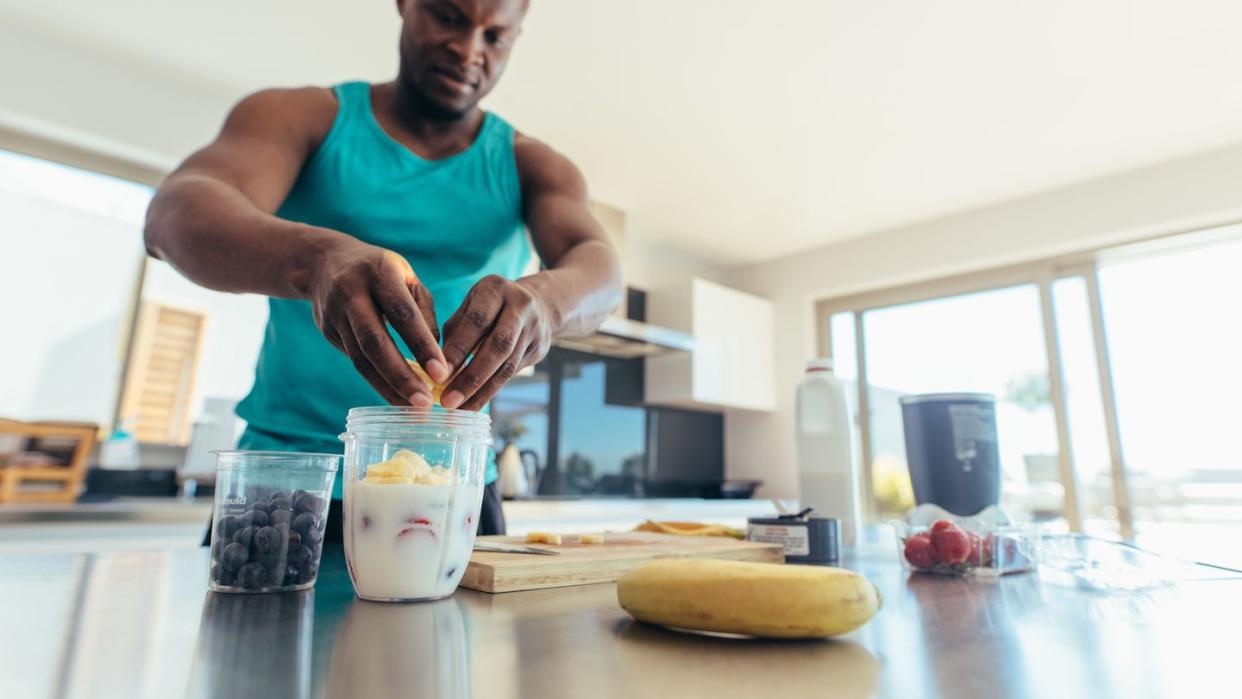This Is How Long You Should Wait to Exercise After Eating

"Hearst Magazines and Yahoo may earn commission or revenue on some items through these links."
YOU'RE HOME FROM work and starving. So, you pound dinner even though you still have to hit the gym tonight. How long you after eating should you wait to workout, anyway?
Food does fuel your body for exercise—after all, calories are energy. It's commonly advised to munch on something prior to hitting the gym. However, working out right after you're done with a big meal might be a different story.
It's possible that eating right before working out can cause stomach problems. And eating too early can leave you feeling sluggish and unproductive during your workout. Plus, depending on your body and your goals, how much you should eat can vary. There's a lot to consider, clearly.
Finding the balance between the two, and snacking on the right things, may mean the difference between having an average workout and having a great one. So, how long should you wait after a meal to workout?
When should you eat before working out?
It kind of depends? Here's the breakdown.
After a small meal or snack: Right after
"If you ate a small meal or snack, you can exercise immediately thereafter," says Brian St. Pierre, a Men's Health nutrition advisor, of course unless it makes you feel ill. That is completely dependent on your body's personal preferences.
In this case, stick to Abeyta's recommendation of a simple carb snack or meal, like fruit or nutrition bar.
After a normal to large meal: Wait 2 to 3 hours
"If you're eating a carb-rich meal for energy, I'd wait 2 to 3 hours afterwards," says Abby Langer, R.D., author of Good Food, Bad Diet. "Otherwise, you're free to work out anytime after a meal, depending on your tolerance for it."
St. Pierre also recommends the same, unless working out on a full stomach doesn't bother you. Feel free to rev up with protein and carbohydrates to your comfort level, especially if you plan on lifting.
Before high intensity exercise: Proceed with caution
If you're ready to log in an intense sweat, you may want to hold off on a larger meal.
"High intensity exercise in particular often requires a longer wait period so the food has a chance to begin moving out of the stomach and into the small intestines before activity begins," says St. Pierre.
"A small meal 0 to 60 minutes before, or a normal to large meal 2-3 hours is a good rule of thumb," he adds. At the end of the day, pay attention to what your body needs and experiment to find what fuels you best, he suggests.
During long endurance exercise: Possibly during
If you're training for a marathon, a triathlon, or any other kind of long endurance race, you may even need a little extra fuel during your training, depending on the distance of your workout that day. Longer distances will require some kind of extra fuel, typically in the form of carbohydrates. This can be in the form of a sports drink or a gel pack that has electrolytes and carbs, according to the Cleveland Clinic.
Consult a running or triathlon coach to figure out exactly how much you should consume during your long distance training.
What are potential side effects to working out too soon after eating?
Working out too soon after eating can really effect some, and do absolutely nothing to others. It's all dependent on your body. The higher the intensity of the activity, the more likely you are to experience these symptoms, according to a study published in the American Journal of Sports Medicine. It's especially common in endurance athletes.
A few potential side effects include:
Nausea
Vomiting
Diarrhea
Abdominal cramping
Sluggishness
Bloating
What should you eat before you work out?
Exactly what you choose as your pre-workout meal is just as much a factor to a good workout as when you eat, says Dezi Abeyta, R.D.N., a Men’s Health advisor, and author of the Lose Your Gut Guide. A simple carbohydrate and some quick-acting sugars will probably give you the energy you're looking for before the gym, without weighing you down. This is especially true if you're about to hit the cardio section. Think fruit, white bread, cereals, bagels, or honey. The heavier carbs like rice and pasta are best saved for after your workout.
Abeyta is cool with some flexibility before a strength-oriented workout though. With cardio, a lot of bouncing may take some extra energy and can cause some stomach issues if fueled incorrectly. With strength training, it's okay to throw in some protein or fats before your workout. The one thing you should stay away from though, Abeyta says, is processed foods.
Don't forget the water either. Too much or too little can leave feeling sluggish and weighed down before a workout. Too little water and electrolytes is a recipe for muscle contraction (your heart included), leading to poor performance, delayed recovery, and dehydration.
You Might Also Like
